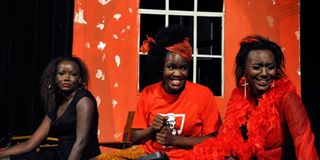Tracing man’s evolution

L-R: The girls Sandra as Kendrah, Rashida as Sara and Nada as Marina on stage during their performance of Afroman Spice. Photo by Edgar R Batte.
From a conversation (girl talk) at lunch about men and experiences of women with reference to African men, Rashida Namulondo, Linda Nabasa (Nada) and Sandra Nankoma (Sandy Soul) created a theatrical production that received massive applause and a double standing ovation. The first of its kind, Afroman Spice incorporated song and poetry.
Told as three separate relationships, Rashida as Sara, Nada as Marina and Sandra as Kendrah, the poets merged drama and music to tales of spoken word, tracing evolution of men from as old as the Ape and Stone Age eras, to the refined 21st Century black man. They dramatised different kinds of men aimed at engaging women to appreciate men and vice versa.
Each character was so distinct and relatable to millions of women across the world. “They had so much chemistry on stage, such strong personal conviction that when each one performed, I thought maybe that is the journey I could take. That conflict was so amazing” a thrilled Beverly Namboozo, poet and founder Babishai Niwe Poetry Foundation, retorts.
While Sara bantered away in dialogue, sparking conversation with the audience in the simplicity of a believable village wife, Marina, the more exotic frustrated woman, aroused pity as she coiled herself in moaning and wailing. Kendrah tickled amusement and pinched words with her mellow singing voice. They diluted women’s expectations of men, and each with their own “the darling, the cow and the myth” showed a variety of men, their virtues and faults.
The sequel of the two-hour piece conjures when Sara meets both women. Her venture to sell them spices succeeds only at the end, after a broken Marina, so drowned in her drugged split personality disorder, stems Sara out of haggling the sale of spices. A confession of the kind of man each woman wants is manifest in song; chanting about taxi and boda boda men dodging potholes, campusers, rich men with money falling around them and men who won’t cheat.
Angella Katatumba closed the night with a vocal implement supported by Kaz Kasozi’s incredible mastery of the guitar.
The trio produced incredible vocal sound, borrowing from American legend Aretha Franklyn and the movie, Sound of Music.
“We felt like we were already a representation of Ugandan women,” Nada said, defending their choice of western music. The multi-national audience was humoured as the trio hit impeccable punch lines with a mixture of English and Luganda, serving lingual benefit. The auditorium was nearly full house. These girls proved that a Ugandan audience can also enjoy and appreciate poetry, which Rashida believes is a powerful instrument of change.
The show was a marvel that performances have been booked at Babishai Niwe Poetry Awards, and dialogue to feature at Bayimba International Theatre Festival is under way.
Esther Tebandeke, who co-directed the piece, was also shocked at the transformation of the characters on stage.




